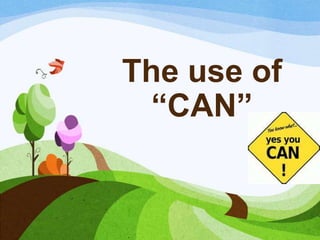Modal can
•Télécharger en tant que PPTX, PDF•
4 j'aime•9,207 vues
Signaler
Partager
Signaler
Partager

Contenu connexe
Tendances (20)
wh-questions-present-simple-grammar-guides_98769.pptx

wh-questions-present-simple-grammar-guides_98769.pptx
En vedette
En vedette (7)
Similaire à Modal can
Similaire à Modal can (20)
Modal can
- 2. Objective • In this activity you will know about the use of the modal can. To give you a better idea you will find some examples and at the end some exercises which help you to practice what you have learned.
- 3. Can (for possibility) • "Can" is one of the most commonly used modal verbs in English. It can be used to express ability or opportunity, to request or offer permission, and to show possibility or impossibility.
- 4. I can snowboard Examples: Positive form
- 5. I can
- 13. Look at the following picture.
- 14. Now write one sentences for each ability.(use the positive, negative and interrogative form. • 1.___________________________________________ ____ • 2.___________________________________________ ____ • 3.___________________________________________ ____ • 4.___________________________________________ ____ • 5.___________________________________________ _____ • 6.___________________________________________
- 15. • If you have any question, please do not hesitate to send me your doubts to • silviaguadaluperamirezgonzalez@gmail.com
